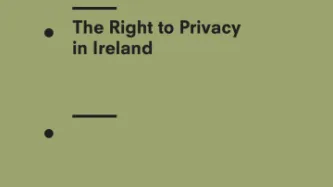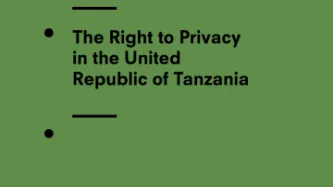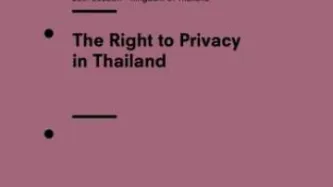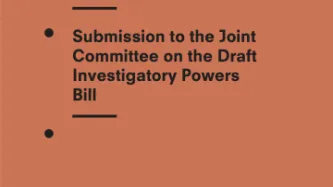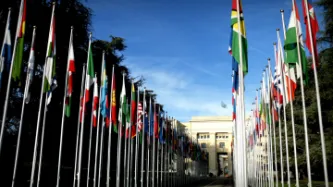Advanced Search
Content Type: Advocacy
This stakeholder report is a submission by the Hungarian Civil Liberties Union (HCLU) and Privacy International (PI). HCLU is a human rights organisation that takes stand against undue interference and misuse of power by those in positions of authority. PI is a human rights organisation that works to advance and promote the right to privacy and ght surveillance around the world. HCLU and PI wish to bring concerns about the protection and promotion of the right to privacy in Hungary before…
Content Type: Advocacy
This stakeholder report is a submission by Privacy International (PI) and Digital Rights Ireland Ltd. (DRI). PI is a human rights organisation that works to advance and promote the right to privacy and ght surveillance around the world. DRI is an Irish group dedicated to defending civil, legal and human rights in a digital age. PI and DRI wish to bring concerns about the protection and promotion of the right to privacy in Ireland before the Human Rights Council for consideration in Ireland…
Content Type: Advocacy
This stakeholder report is submitted by the Tanzania Human Rights Defenders Coalition, the Collaboration on International ICT Policy in East and Southern Africa and Privacy International (PI). PI, THRDC and CIPESA wish to bring concerns about the protection and promotion of the right to privacy in the United Republic of Tanzania (thereafter “Tanzania”) before the Human Rights Council for consideration in its upcoming review.
Content Type: Advocacy
This stakeholder report is a submission by Privacy International (PI) and Thai Netizen Network (TNN). PI is a human rights organisation that works to advance and promote the right to privacy and ght surveillance around the world. TNN is a Bangkok-based organisation that works to promote human rights in Internet policy and support the work of human rights defenders in digital environment. PI and TNN wish to to bring concerns about the protection and promotion of the right to privacy in…
Content Type: News & Analysis
On Tuesday (16th February 2016) Apple posted a message to their customers stating that the company had been ordered by the FBI to “make a new version of the iPhone operating system, circumventing several important security features, and install it on an iPhone recovered during the investigation.” Apple are currently opposing this order. A fascinating debate is currently playing out in the media about whether Apple should comply with or resist the FBI's demands.
Whatever…
Content Type: Press release
In response to the Investigatory Powers Tribunal (IPT) ruling today that GCHQ's hacking is lawful, we have issued the following press statement:
"We are disappointed by the IPT’s judgment today, which has found Government hacking lawful based on a broad interpretation of a law dating back to 1994, when the internet and mobile phone technology were in their infancy.
Until we brought this case, GCHQ would neither confirm nor deny that it was they were engaging in mass hacking of…
Content Type: Long Read
The Investigatory Powers Tribunal (“IPT”) today held that GCHQ hacking of computers, mobile devices and networks is lawful, wherever it occurs around the world. We are disappointed that the IPT has not upheld our complaint and we will be challenging its findings.
Our complaint is the first UK legal challenge to state-sponsored hacking, an exceptionally intrusive form of surveillance. We contended that GCHQ hacking operations were incompatible with democratic principles and human rights…
Content Type: Press release
Today’s report by the Joint Committee on the Investigatory Powers Bill is the third committee report that concludes that the Home Office has failed to provide a coherent surveillance framework.
The Joint Committee on the Investigatory Powers Bill today published a 198 page report following a short consultation period between November and January. Their key findings are that:
- the definitions in the bill need much work, including a meaningful and comprehensible…
Content Type: News & Analysis
The problems with thematic warrants and why they should be removed from the UK Government’s Investigatory Powers Bill
We currently have the rare opportunity to scrutinise and debate the powers that law enforcement, the security and intelligence agencies and public bodies should have to interfere with our private communications, our devices and our digital lives. These powers are being enshrined and expanded upon in the draft Investigatory Powers Bill (IP Bill), currently under scrutiny by the…
Content Type: Press release
Gus Hosein, Executive Director, Privacy International said:
“Parliament's Intelligence and Security Committee (ISC) has today slammed the Government’s draft Investigatory Powers Bill for its lack of transparency, lack of clarity and lack of privacy protections. We urge the Home Office to take on board the wide ranging criticisms that the tech sector, civil society, and now even the Parliamentary committee that oversees the surveillance capabilities of the intelligence agencies, have made of…
Content Type: Advocacy
In response to the Government publishing proposed new surveillance powers in November 2015, Privacy International submitted this highly detailed analysis to the Joint Committee on the Draft Investigatory Powers Bill in December. Our report proposes significant changes across the Bill to ensure better privacy protection while still enabling public bodies to have the powers they need.
Content Type: News & Analysis
How not to do data-driven due diligence
A powerful new VICE News investigation has blown open the secretive world of risk management and the most influential database you've never heard of: World-Check.
Over 300 government and intelligence agencies, 49 of the 50 biggest banks, and 9 of the top 10 global law firms use World-Check to conduct due diligence, including checking compliance with anti-terrorism financing and sanctions laws. World-Check gathers and analyses open source…
Content Type: Press release
Privacy International welcomes the Committee’s report on the draft Investigatory Powers Bill (IP Bill). The report mirrors what many from across the technology sector and civil society have been saying: the lack of clarity in the draft Bill risks undermining security and privacy.
The Committee encountered almost universal confusion regarding the meaning of “Internet Connection Records” and what the collection of such records would entail. …
Content Type: News & Analysis
In 2015 the United Nations' human rights mechanisms significantly increased their capacity to monitor and assess states' compliance with their obligations around the right to privacy. Notably, the Human Rights Council established the mandate of the Special Rapporteur on the right to privacy, filling a significant gap in the international human rights protection system. Meanwhile, the Human Rights Committee put surveillance laws and practices in a range of countries under close scrutiny, making…
Content Type: News & Analysis
As we mark the 750th anniversary of the first parliament called in Britain, its time for intelligence agencies to tell the truth.
After the fall of the Berlin wall, the new German government dedicated its commitment to democracy by physically building transparency into the political process - the impressive glass cupola of the Reichstag, the expansive glass walls of the ministry buildings and in the chancellery all encourage public curiosity and…
Content Type: News & Analysis
The major overhaul of data protection laws in Europe is finally over, after three years of arduous and sustained political and lobbying activity by all those with a major stake and interest, including us at Privacy International (See our initial analysis of the two laws in 2012). We welcome this long overdue closure, but is this 91-articled, 200-paged piece of legislation been worth the enormous effort and no doubt millions of euros, dollars and pounds spent on it?
The legislative package…
Content Type: Press release
Statement by European Digital Rights (EDRi), Bits of Freedom, Digitale Gesellschaft e.V, Digital Rights Ireland and Privacy International following the vote of the European Parliament’s Civil Liberties Committee on the Data Protection
In January 2012, the European Commission, following extensive consultations, published a draft Regulation and a Directive to create a strong framework for data protection in the EU. The initiative had three priorities – modernisation of the legal framework for…
Content Type: News & Analysis
In an enormous breakthrough for those seeking transparency and accountability to the shadowy surveillance industry, the Swiss Government has been forced to publish the list of export licenses for surveillance technologies and other equipment, including details of their cost and destination.
The decision by the Federal Information and Data Protection Commissioner comes on the heels of consistent pressure from Privacy International, Swiss journalists, and several Members of Parliament on…
Content Type: News & Analysis
Sometimes it takes an unexpected stranger to remind you what you have, and what you are at risk of losing. Roman Zakharov, a Russian publisher who challenged Russia’s surveillance legislation, is that stranger for many Brits and Europeans. The Grand Chamber of the European Court of Human Rights judgement on Friday 4 December 2015 was remarkable, not because it tore up the rule book on the jurisprudence surrounding state surveillance in the Council of Europe, but because it followed…
Content Type: News & Analysis
Internet Connection Records are a new form of communications data created by the Investigatory Powers Bill at Parts 3 and 4. They constitute an unlawful interference with privacy with the ability to provide a highly detailed record of the activities of individuals, profiling their internet habits.
Clause 62 of the Investigatory Powers Bill (“IP Bill”) permits a wide range of public authorities to collect Internet Connection Records, however throughout debates on this highly controversial new…
Content Type: Press release
This is Privacy International's submission in response to the Science and Technology Committee's call for evidence on the draft Investigatory Powers Bill.
Content Type: News & Analysis
This guest post was written by Nighat Dad and Adnan Chaudhry of Digital Rights Foundation.
It is the role of the state to protect its citizens from threats to their life and liberty. But in protecting its citizens, the state’s own aims cannot be counterproductive and erode the security found in rights like privacy and freedom of expression that are vital to a democratic system.
However, it has too often been the case that governments will pursue and enact legislation that provides more…
Content Type: Press release
Documents released today confirm GCHQ, the UK intelligence agency, is hacking computers in the United Kingdom without individual warrants. The documents contain previously unknown details and defenses of GCHQ's use of "thematic warrants" to hack. The legal challenge in which these documents are being disclosed was brought by Privacy International and seven internet and communications service providers from around the world in response to disclosures made by Edward Snowden.…
Content Type: Press release
A 400 gigabyte trove of internal documents belonging to surveillance company Hacking Team has been released online. Hacking team sells intrusive hacking tools that have allegedly been used by some of the most repressive regimes in the world.
The documents reportedly confirm Hacking Team has customers in 35 countries, including some that routinely abuse human rights. These documents seemingly validate research conducted by Citizen Lab…
Content Type: Press release
A joint statement from international and domestic civil society organisations expresses continued serious concerns regarding the passage of Pakistan’s Prevention of Electronic Crimes Bill. Privacy International, ARTICLE 19, Human Rights Watch, Association for Progressive Communications, Digital Rights Foundation, and other human rights organisations including the Human Rights Commission of Pakistan are calling for the bill currently awaiting debate in the National Assembly to be scrapped and…
Content Type: News & Analysis
The relationship between users and companies is based primarily on trust. However, many recent developments have the potential to undermine this trust and to question companies loyalties to their users. From excessive data collection and transmission to the failure to guard against basic security risks, one could be forgiven for thinking that the privacy and security interests of users and devices have taken a back seat. Governments of the world are unilaterally endeavouring to…
Content Type: Press release
Privacy International is deeply disturbed by the Moroccan government’s crackdown on media, human rights defenders, and civi society. Our friend Hisham Almiraat will be appearing in court on Thursday November 19th, 2015 along with six other journalists and human rights defenders members, and is facing the charges of “receiving foreign funding without notifying the General Secretariat of the government” and charges of “threatening the internal security of the State”, an offense that can lead…
Content Type: Long Read
Written by Eva Blum-Dumontet
A recent case of lèse-majesté in Thailand (speaking ill of the monarchy) is a worrying example of how Western companies do not just work with governments that fall short of international human rights standards, but can actually facilitate abuses of human rights.
Our investigation on the trial of Katha Pachachirayapong — accused of spreading rumours on the ill-health of the King Bhumibol Adulyadej, thereby causing sharp falls in the Thai stock market — reveal the…
Content Type: Report
In response to the Government publishing proposed new surveillance powers in November 2015, Privacy International submitted this highly detailed analysis to the Science and Technology Committee on the Draft Investigatory Powers Bill in November 2015. Our report proposes significant changes across the Bill to ensure better privacy protection while still enabling public bodies to have the powers they need.
Content Type: News & Analysis
The UK Government introduced a draft surveillance bill on Wednesday – the innocuously named 'Investigatory Powers Bill'. Trumpeted as 'world leading' by the Home Secretary, the only sense in which this is true is that other Governments around the world will now also seek a mandate for mass surveillance and hacking.
Until recently, the idea that a Government agent could hack a mobile phone and turn on its camera and microphone to bug a conversation in a room was the realm of science fiction, or…

